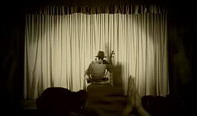Blind Abing's original name was Hua Yanjun. He was born in 1893 and died in 1950. His father and mother died very early, he was adopted by the Taoist Hua Qinghe, master of the local Leizun Temple, and so became a Taoist apprentice. From his childhood onward, Blind Abing learnt music from Hua Qinghe. Later, when Abing came across a tune he liked and whoever was playing it, he did his utmost to learn from them, with the result that he learned to play many of the local instruments quite well.
When he was a Taoist, since he loved performing, he also joined a
Chuigu(traditional wind and percussion) ensemble, playing in wedding and funeral processions. The Taoists believed this was causing them to lose face, and so they ejected him from their ensemble. Thus, Abing became a
Chuiguplayer. While being a
Chuiguplayer, again because he loved performing, he often went to the market to play, or wandered about the streets until someone called on him to perform. The
Chuiguensemble believed him to be contravening their customs, and consequently excluded him from their group. In this way, he became a pure and simple wandering street musician.
Originally, Abing wasn't blind. When he was 35 years old (1927), he didn't get immediate treatment for an eye disease and completely lost the sight of both eyes. From this time onwards, he was known as Blind Abing, and ordinary people gradually forgot his original name. He himself often told people not to use his original name, saying, "I haven't used the name Hua Yanjun for ages, no one knows it. It's better if you call me Blind Abing; that's the name that everyone on the street knows."

There were also those who considered Blind Abing a beggar. But, in fact, he had nothing at all in common with these social parasites. He never freely accepted charity from other people; he simply relied on performance to maintain himself. When people asked him to perform, even without giving him any money, he was still happy to do so.
Abing had collected, arranged and created scores of music pieces in his lifetime. In 1951, the year of his death, six of his performances were recorded by a visiting team of Chinese musicologists (who happened to be in Wuxi engaged in a different research project): on three he played theErhu(two-stringed Chinese fiddle) and on the other three thePipa(four-stringed, pear-shaped lute). These performances were later published in music notation as instrumental solos to be performed by new generations of Chinese conservatory-trained musicians.
